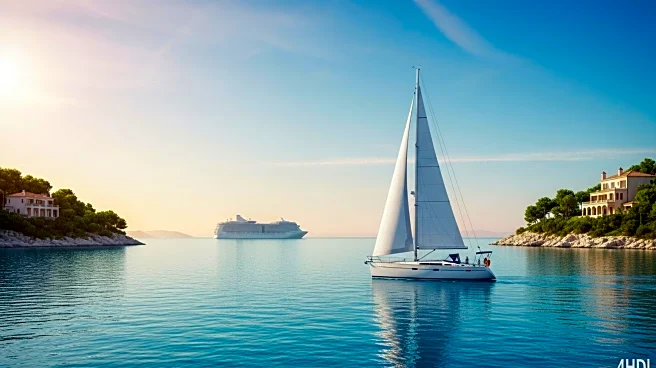What's Happening?
The regional prefect for Alpes-Maritimes has finalized new rules to manage large cruise ship calls in the French Riviera, following local attempts to regulate the industry. The rules, announced by regional prefect Laurent
Hottiaux and Maritime Prefect Christophe Lucas, aim to balance environmental concerns with economic interests. The regulations include a maximum of 3,000 passengers per cruise ship stopover and a limit of one ship per day for vessels with more than 1,300 passengers. Additionally, during peak seasons, only 15 ships per month will be allowed. The rules prioritize cruise lines adhering to the 'sustainable Cruise in the Mediterranean' charter, which promotes less polluting fuels and emission management.
Why It's Important?
These regulations are significant as they address the growing environmental concerns associated with large cruise ships in the French Riviera, a popular tourist destination. By limiting the number of passengers and ships, the authorities aim to reduce pollution and preserve the region's natural beauty. The rules also reflect a broader trend of balancing tourism with sustainability, which could influence similar policies in other regions. The economic impact is also considered, as the regulations aim to maintain tourism revenue while addressing local concerns about environmental degradation.
What's Next?
The new rules will be presented to the public for comments before being finalized and published in a prefectural decree. Stakeholders, including municipal authorities, the Chamber of Commerce, and the Cruise Line International Association, have been involved in the discussions. The authorities are confident that the regulations will balance local concerns with economic interests, ensuring the tranquility of the region while accommodating tourism. The focus will be on monitoring compliance with the sustainable cruise charter and managing emissions during peak pollution events.
Beyond the Headlines
The implementation of these rules highlights the ethical and environmental responsibilities of the cruise industry. It underscores the need for sustainable tourism practices that protect local ecosystems while supporting economic growth. The focus on sustainable fuels and emission management could set a precedent for other regions facing similar challenges, promoting a shift towards environmentally responsible tourism.









